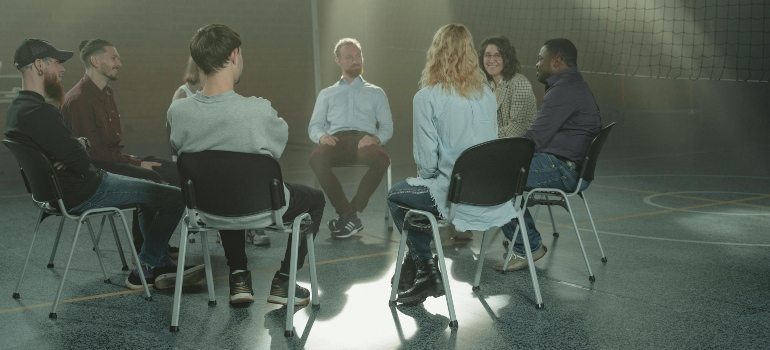Facing life’s challenges can sometimes feel like being caught in a storm without shelter. When the difficulty of dealing with mental health issues, addiction, or other personal struggles becomes overwhelming, it’s important to remember that you’re not alone. Seeking help is a brave and significant first step towards healing and rediscovery. If you find yourself or a loved one at this crossroads, considering extended residential treatment in West Virginia might be the answer you’ve been searching for. In this blog post, we’re going to discuss the reasons to seek extended residential treatment in WV. With an understanding of the difficulties you’re facing, we are here to explain how it can offer you the tools, support, and time you need to navigate through your storm.
Reasons to Seek Extended Residential Treatment in WV
Extended residential treatment in West Virginia for addiction is like having a safe house on your journey to recovery. It’s a place where you live for a while — away from the usual pressures and triggers of daily life — so you can focus solely on getting better. This kind of treatment involves staying in a facility that feels more like a home than a hospital, where you get constant support from professionals who understand what you’re going through. They offer therapy, activities, and programs designed to help you understand your addiction, learn new coping strategies, and build a foundation for a life without dependence on substances. Now, let’s take a look at why choosing extended residential treatment in WV might be the best next step for you or your loved one.

Comprehensive Care
Extended residential treatment programs treat your body, your heart, and your mind. When you’re struggling with addiction, it’s not just about the physical craving for substances; it’s also about the storm of emotions and thoughts that come with it. That’s why these programs don’t just focus on one part of you; they care for all of you.
In these drug rehab centers in WV, you live in a place that’s set up to help you heal 24/7. Imagine having a team of friends around all the time, day and night, ready to support you, teach you new ways to cope, and help you understand why addiction became a part of your life. This constant care and supervision mean you’re never alone on your journey to getting better.
The beauty of being in a structured residential setting is that your day has a clear shape to it — there’s time for learning, time for therapy, and time for activities that help you heal. This structure helps bring back a sense of normalcy and control to your life, something that often gets lost in the chaos of addiction.
Let’s say, for example, you find evenings particularly tough. In the outside world, this might be when you’d feel most tempted to slip back into old habits. But in extended residential treatment, during this time, you could be talking through your feelings with a counselor, sharing your experiences with others in a group session, or maybe even practicing relaxation techniques.
Safe and Supportive Environment
When you’re trying to recover from addiction, everyday life can throw a lot of distractions and reminders of old habits your way, making it really hard to stay on track. That’s one of the reasons to seek residential treatment in WV. It offers a retreat into a more serene and focused setting, away from these potential triggers. In this setting, individuals can focus their attention and efforts solely on their recovery without any distractions or external pressures.
Additionally, the sense of community within the residential treatment center West Virginia offers significantly enhances this experience. Being surrounded by others who are facing similar challenges creates a network of mutual understanding and support. This community acts as a collective force, offering encouragement, sharing experiences, and providing a sense of belonging. Each member contributes to a shared goal of recovery.

Furthermore, the professionals and staff in these facilities play a crucial role. With their expertise and empathy, they act as knowledgeable guides through the complexities of addiction. Their support is not just clinical; it’s deeply personal. They offer tailored advice, teach effective strategies for managing difficult emotions, and help illuminate the path forward.
Structured Routine and Accountability
A structured daily routine provides a sense of stability and predictability. When you know what to expect each day, it becomes easier to focus on your recovery without feeling overwhelmed by uncertainty. Scheduled therapy sessions ensure that you have regular opportunities to work through your thoughts and feelings with a professional.
Educational workshops can also play a significant role in teaching you about the nature of addiction, coping strategies, and how to manage triggers. Knowledge is power, and understanding more about your situation can empower you to make decisions about your life and recovery.
Together, these components of a structured daily routine and accountability help foster the development of healthy habits. The discipline gained from sticking to a schedule can translate into other areas of life, encouraging a more organized and proactive approach to challenges. Additionally, as you start seeing progress in your recovery, your self-esteem begins to improve. Achieving small goals, like completing a daily schedule, can provide a sense of accomplishment.
Medical and Clinical Supervision
One of the key reasons to seek extended residential treatment in WV is the availability of comprehensive medical and clinical supervision. This means that individuals have access to a wide range of healthcare professionals, including psychiatrists, therapists, and addiction specialists. Therefore, they work together to oversee the individual’s progress and tailor a treatment plan.
Psychiatrists may manage any necessary medications during medication assisted treatment West Virginia rehabs offer, helping to stabilize mood or treat any co-occurring mental health conditions. Therapists provide ongoing support through individual and group therapy sessions, offering a space for individuals to explore the root causes of their addiction and develop coping strategies. Addiction specialists focus on the specifics of substance use disorder, guiding individuals through the stages of recovery.

Having this level of medical and clinical supervision within a residential treatment setting is invaluable. It ensures that any medical issues that arise can be promptly addressed, and adjustments to the treatment plan can be made in real-time, based on the individual’s progress. This immediate access to a range of specialists also means that the treatment can be highly personalized, which is often crucial for effective recovery.
Intensive Therapy and Counseling
In residential treatment programs, individuals have access to various intensive therapy and counseling services. These aim to help individuals address underlying issues, develop coping skills, and build resilience. Some of the therapies include:
- Individual Therapy: This involves one-on-one sessions with a therapist, where individuals can explore their thoughts, emotions, and behaviors in a safe and confidential space. Therefore, it allows for personalized attention.
- Group Therapy: In group therapy, individuals come together with peers who are facing similar struggles. Led by a therapist, these sessions provide a supportive environment for sharing experiences.
- Family Therapy: Family therapy involves sessions with the individual and their loved ones to address relationship dynamics, communication issues, and family patterns that may contribute to the addiction. It helps to foster understanding and improve communication.
- Cognitive-Behavioral Therapy (CBT): CBT focuses on identifying and changing negative thought patterns and behaviors that contribute to addiction. By learning to challenge and reframe unhelpful beliefs, individuals develop healthier coping strategies.
- Dialectical Behavior Therapy (DBT): DBT combines elements of CBT with mindfulness techniques to help individuals regulate emotions, manage distress, and improve interpersonal relationships. It emphasizes acceptance and change, providing practical skills to cope with intense emotions.
- Trauma-Informed Care: This approach recognizes the impact of past trauma on an individual’s life and addiction. Through trauma-informed therapy in drug and alcohol treatment centers in West Virginia, individuals learn to process and heal from past traumatic experiences.
Holistic Approach to Healing
Alongside counseling and medical support, individuals often find solace and strength in alternative therapies. These holistic modalities, including art therapy, music therapy, yoga, meditation, and mindfulness practices, play a crucial role in promoting overall wellness and self-discovery.
Art therapy provides a creative outlet for expression, allowing individuals to explore their emotions and experiences through various art forms. Similarly, music therapy harnesses the power of sound and rhythm to evoke emotions, reduce stress, and foster healing. These creative activities offer individuals new ways to communicate and process their feelings.
Yoga, meditation, and mindfulness practices encourage individuals to connect with their bodies and minds, promoting relaxation, stress reduction, and emotional balance. Through gentle movement, breathwork, and guided meditation, individuals learn to cultivate present-moment awareness and develop inner peace. These practices not only enhance physical and mental well-being but also deepen self-awareness.
Peer Support and Community Engagement
One of the reasons to seek extended residential treatment in WV is peer support and community engagement. Through group therapy sessions, support groups, and recreational activities, individuals in recovery have the opportunity to connect with others who understand their struggles and share similar experiences. These interactions foster camaraderie, empathy, and connection.
Additionally, recreational activities, such as sports, art classes, or outdoor adventures, provide opportunities for individuals to bond over shared interests and hobbies. These activities not only promote physical health and well-being but also foster social connections and a sense of belonging.

In order to connect people with similar interests and needs, West Virginia offers specialized rehabs for different age groups. They cater to the unique needs of different populations, including:
- Rehab for Seniors
- Rehab for Young Adults
- Rehab for Professionals
For example, seniors may benefit from programs that address age-related health concerns and focus on building social connections, while young adults may benefit from a rehab center for young adults that provides education and support for transitioning into independent living. Professionals may benefit from programs that offer flexible scheduling and accommodations for maintaining work responsibilities.
Relapse Prevention and Aftercare Planning
In substance abuse treatment WV offers, preventing a return to old habits is a top priority. These programs place a strong emphasis on relapse prevention and aftercare planning to ensure individuals have the support they need for long-term success.
First and foremost, personalized relapse prevention strategies are developed during treatment. Counselors work closely with individuals to identify potential triggers and high-risk situations. Together, they create a plan of action to address these challenges.
Discharge planning is another crucial aspect of extended residential treatment. As individuals near the end of their program, counselors help them create a comprehensive plan for transitioning back to their daily lives. This includes identifying supportive resources and making connections to outpatient programs, sober living homes, and community resources for ongoing support.
Long-Term Recovery Support
Extended residential treatment programs prioritize long-term recovery support to ensure individuals continue to thrive after completing the program. One crucial aspect of this support is alumni programs. They provide a sense of community and connection among individuals who have completed treatment. These programs offer ongoing support, encouragement, and opportunities for socializing.

Follow-up services are another essential component of long-term support. Counselors and staff maintain contact with individuals after they leave the residential setting, offering guidance, encouragement, and assistance as needed. This may include check-in calls, follow-up appointments, or referrals to additional services.
Additionally, ongoing support networks play a vital role in helping individuals maintain sobriety and navigate life after treatment. These networks may include support groups, such as Alcoholics Anonymous (AA) or Narcotics Anonymous (NA), as well as community-based organizations that provide assistance and resources.
Key Reasons to Seek Extended Residential Treatment in WV
There are numerous reasons to seek extended residential treatment in WV. With a focus on comprehensive care, structured support, and personalized treatment, these programs offer individuals the tools and resources they need to overcome addiction and achieve long-term recovery. From intensive therapy sessions to holistic modalities and ongoing support networks, extended residential treatment provides a safe and supportive environment where individuals can heal and thrive. If you or a loved one are struggling with addiction or other challenges, remember that help is available. Reach out to a trusted healthcare provider, counselor, or treatment facility to explore your options. You don’t have to face these challenges alone.



